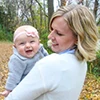The Baby Sleep Site®: Your Pediatric Sleep Experts and Consultants For 15+ Years
A Holistic and Gentler, Kinder Approach to Better Baby Sleep
The Baby Sleep Site®: Your Pediatric Sleep Experts and Consultants For 15+ Years
A Holistic and Gentler, Kinder Approach to Better Baby Sleep
500+ Articles About Baby and Toddler Sleep
Restful Nights and Better Tomorrows For 15+ Years
Millions of Happy, Rested Families
Your Baby’s Sleep At-a-Glance: Average Sleep Needs by Age
Babies need a lot of sleep! But, just how much you ask? While newborn babies sleep almost the entire day, they go through many changes in the first few years and will need a variable number of hours of sleep every day. Getting enough sleep is important for your baby’s health, development, mood, and behavior. Although some babies are happy despite being sleep-deprived, many babies get irritable, not to mention you, their parents! Some babies can sleep through the night by 6 months of age, but not all do. Check the chart of realistic sleep expectations to see if your baby is getting enough sleep, based on recommendations from the American Academy of Pediatrics (AAP) as well as 15+ years of experience.
Newborns
9-10 hours of nighttime sleep and 5-6 hours during the day broken into fragments
4 Months
11-12 hours at night and 3-4 hours in 3-4 naps
5 Months
11-12 hours at night and 3-3.5 hours in 3-4 naps
6 Months
11-12 hours at night and 2-3 hours in 2-3 naps
7 Months
11-12 hours at night and 2-3 hours in 2-3 naps
8 Months
11-12 hours at night and 2-3 hours in 2-3 naps
9 Months
11-12 hours at night and 2-3 hours in 2 naps
10 Months
11-12 hours at night and 2-3 hours in 2 naps
11 Months
10-12 hours at night and 2-3 hours in 2 naps
12 Months
10-12 hours at night and 2-3 hours in 2 naps
Toddlers
10-12 hours at night and 2-3 hours in 1-2 naps, depending on age
Preschoolers
9-10 hours of sleep including 0-1 nap
Most Common Baby Sleep Problems By Age
Newborns – The most common concerns we get from parents of newborns are how to reduce the risk of SIDS, sleep safety, how to fix day/night confusion, and when you can put your baby on a schedule. Download our free e-Book, 15 Baby Sleep Facts New Parents Need to Know.
2-3 Month Olds – Your 2-month-old is still becoming more aware of the world and you may be wondering when he or she will stay awake longer during the day. Have no fear, that will begin soon! At this age, we hear from parents that your baby may not want to be laid down flat or won’t sleep in the bedside bassinet. You may be interested in our 2-3 Month Old Guide.
4 Month Olds – At 4 months, sleep is still organizing while your baby is consolidating sleep periods. Therefore, the primary concerns from parents tend to be related to too many naps, often short naps, or babies who only sleep in your arms or on your chest. This is also the point your baby’s sleep changes fundamentally with the 4-month sleep regression.
5 Month Olds – Your 5 month old will likely be sleeping in longer stretches at night. For some of you, that might mean 5-6 hours while others may even have your baby sleeping through the night. However, we often hear about babies waking every 1-2 hours all night at this age and/or taking short naps. If this is the case for you, this would be a great time to download our free e-Book 5 Ways to Help Your Child Sleep Through the Night, if you haven’t already.
6 Month Olds – Around this age, many parents are eager to put their baby on a schedule if the baby hasn’t naturally put themself on one, yet. Between short naps and unpredictable days, some parents are feeling fairly frustrated by this age. If you haven’t already, be sure to pick up your free e-Book, 7 Common Napping Mistakes, today!
7 and 8 Month Olds – In this age range, 7 and 8 month old babies have learned about object permanence which means they may be exhibiting separation anxiety (get upset when you leave the room). When it comes to sleep, these babies may begin skipping their third nap which can lead to some sleep disruption and we have many parents asking about night-weaning. You probably want to read about 3 Signs It May Be Time For Night-Weaning Your Baby.
9 and 10 Month Olds – This age is so fun when your 9 or 10 month old is becoming more mobile, often learning to sit up, stand up, cruise furniture, and some even begin walking! This is super fun but super disruptive to sleep most of the time. Read more about the 8-9-10 Month Old Sleep Regression to make sure you know what’s going on.
11 and 12 Month Olds – The most common question we get about 11 and 12 month olds is whether it’s time to transition to one nap. And, the answer is “no” most of the time. The average age to transition to one nap is around 15-18 months old. Is your baby skipping one of their naps? Read Why Not All 12 Month Olds Transition to One Nap today, so you are prepared.
13 and 14 Month Olds – At this age, most parents are having a lot of fun with their toddler who may be saying a few words and walking around the house. However, sleep-wise, the most common complaint is their toddler is still not sleeping through the night and/or they are still seeing short naps. Read about the 4 Top Toddler Sleep Questions today to learn more about your toddler.
15 and 16 Month Olds – This is a very common age to transition to one nap if your toddler hasn’t done so, already. Unfortunately, this transition can be a difficult one. Check out the Ultimate Toddler Nap Guide to answer your pressing toddler nap questions.
17 and 18 Month Olds – What is the most common complaint about 17 and 18 month olds? You guessed it – another sleep regression! At 18 months old, we often hear about toddlers waking at night again and skipping some naps or taking short naps, AGAIN! It can feel like the newborn days all over again. Read more about the 18-month sleep regression.
19 to 23 Month Olds – This age range is often the best sleep for those of you who solved sleep problems earlier. We still hear about toddlers waking at night or having nap problems in this age range, but it’s often related to an issue that has gone unresolved for quite some time. If you haven’t already, now would be a good time to download Toddler Sleep Secrets, one of our free e-Books.
2 Year Olds – Whether your 2 year old was an amazing sleeper as a baby or had a lot of sleep problems, 2 year olds come with a new host of sleep challenges to solve. Learn 5 Things You Need to Know About Your 2 Year Old’s Sleep.
3-5 Year Olds – Preschoolers are generally good sleepers, except we often hear from parents about late bedtimes, early waking, needing a parent in the room as the fall asleep, and sometimes nighttime fears. We also help some families transition their child to their own bed and room after co-sleeping for quite some time. This is also a common age to drop their nap. You may be interested in learning 3 Signs Your Toddler Is Ready to Stop Napping.
Sign Up for our Mailing List and Download Your FREE Guide: 5 Ways to Help Your Child Sleep Through the Night
Join over 500,000 parents around the world & sign up today to receive the guide and our Baby Sleep Newsletter absolutely FREE!
Privacy Policy: We will NEVER share your information with third parties!
Sample Sleep Schedules By Age
Looking for sample sleep schedules including feedings? All of our schedules are free, breastfeeding-friendly, and practical. Not all babies sleep well day and night without some coaching on our part. They often wake up between sleep cycles. But, one of the first things you can do is get your baby on a good sleep schedule or routine. Here are just a few to get you started:
Newborn Schedules By Age
2 Month Old Baby Sleep Schedule
3 Month Old Baby Sleep Schedule
4 Month Old Baby Sleep Schedule
5 Month Old Baby Sleep Schedule
6 Month Old Baby Sleep Schedule
7 Month Old Baby Sleep Schedule
8 Month Old Baby Sleep Schedule
9 Month Old Baby Sleep Schedule
10 Month Old Baby Sleep Schedule
11 Month Old Baby Sleep Schedule
12 Month / 1 Year Old Sleep Schedule
13 Month Old Baby Sleep Schedule
14 Month Old Baby Sleep Schedule
15 Month Old Baby Sleep Schedule
16 Month Old Baby Sleep Schedule
Toddlers Schedules by Month
Frequently Asked Questions
Newborns sleep 14-16 hours per day for 1-3 hours at a time. 4 to 6-month olds sleep 11-12 hours at night and 3-4 hours during the day. 7 to 18-month olds sleep 10-12 hours at night and 2-3 hours during the day.
Unless your baby literally never wakes up, not even to eat, there is most likely no reason to worry your baby is sleeping too much. In the first few weeks, it’s also very common for you to need to wake your baby every 2-3 hours to ensure they eat. And, they may go right back to sleep after a feeding. It is very typical for newborns to sleep anywhere from 14 to 18 hours a day, on average. If your baby is sleeping too much during the day but wants to party at night, they most likely have days and nights mixed up. Read more about Newborn Day / Night Confusion.
There are 3 primary reasons your baby may be sleeping more than usual: Growth spurt, teething, or illness. Learn all about the reasons babies sleep more than usual.
There are many reasons why babies wake frequently at night. Learn 5 Ways to Help Your Baby Sleep Through the Night
Most babies are capable of sleeping 5 hours at night by 8-12 weeks old. Babies sleep all night around 4-6 months old if they are formula-fed and around 6-12 months old if they are breastfeeding. Read more about when babies sleep through the night.
Need Personalized Guidance to Help Your Baby Sleep?
Get Personalized Sleep Coaching from a Baby Sleep Consultant
As a parent, it can be overwhelming to experience the innumerable curveballs coming from every side! And the worst is when you are unable to get, heck even think of, a good night’s sleep. One night after the other, waking up multiple times to help your baby sleep and getting yourself back to sleep can take a toll on your body and mind. After all, you can only handle so much pressure. Thankfully, relief is right around the corner! At The Baby Sleep Site®, we have experienced baby sleep consultants with 12-15+ years of experience who will create a Personalized Sleep Plan® just for your little one. Every household has unique factors to consider for optimal sleep, and you are not alone: 500,000 parents just like you visit our site each and every month.
You can count on us to respect your wishes and develop healthy sleep habits for your child with a structure that best suits your lifestyle. Let’s talk about your interest in newborn sleep training today.
So, prepare to say goodbye to sleep deprivation, and hello to a happy, healthy child who has mastered sleeping through the night!

The Baby Sleep Site in 90 Seconds:
Strengthen Your Village with a Baby Sleep Expert
Sometimes, it does indeed take a village to help your baby sleep and to get some rest yourself…and that’s precisely who we are! Consider our infant sleep consultant a virtual extension of your “village.” First, here is just a glance at what it’s like in this village each and every day.
We are your baby sleep coach, and we offer a Personalized Sleep Plan designed by an experienced baby sleep consultant that builds around your parenting style in accordance with your needs, and more importantly in line with your newborn or toddler’s temperament.
Our infant and toddler sleep consulting approach is built around your needs, your parenting style, and your child’s temperament
You choose the most effective way for us to work together: emails, phone calls, video conferences, text messages, or online chat all work well for collaborating on newborn sleep training.
Baby sleep consultations should be readily available and affordable. This is why we offer everything from free resources to one-on-one support.
Founded in 2008, The Baby Sleep Site is a baby sleep consultant market leader with a half million email subscribers, hundreds of thousands of Social Media followers, and over 50,000 sleep graduates.
We are invited into new villages every day and can’t wait to meet yours!
About Nicole Johnson – President and Lead Sleep Consultant of The Baby Sleep Site
Nicole Johnson, B.A., M.B.A., is the founder of The Baby Sleep Site and has been the lead pediatric sleep consultant for over 15 years. She is available as a media source, for interviews, podcasts, and live events. She has personally worked with thousands of families, been quoted 100+ times in media, appeared on numerous television interviews, and has been a guest on countless podcasts/shows. She is currently working directly with clients, was named one of Tuck’s Best Sleep Consultants in 2021, and is an expert reviewer on MomJunction and Sleep Advisor.

We help families every day with these common sleep problems:
Frequent Night-Waking and Early Waking
Short Naps
Sleep Regressions
Night Weaning
Schedules, Daycare, and Nap Transitions
Transition to Crib or Bed
Sleep Training and Gentle Sleep Coaching
Better Sleep for Breastfeeding Mothers
Balancing solid foods, milk, and sleep
We also help with these sleep problems…
Sleep coaching while bed-sharing
Transitioning children to their own beds after long-term co-sleeping
Multiple caretakers and/or homes
Children refusing to eat during the day and eating mostly at night (also known as reverse cycling)
Extended room-sharing and small homes
Preschool and school-aged children
Travel and sleep
and much more!
Testimonials from Happy and Well-Rested Families
Before finding The Baby Sleep Site, I was stuck in frustration and confusion on what way was best, how to implement sleep training successfully, and honestly, listening to everyone around me who didn’t have sleep problems thinking “Where did I go wrong?” The Baby Sleep Site assured me that I was a good mom but my daughter’s temperament was more sensitive than other children’s; not a bad thing, just needing a different approach! It was refreshing to hear that and to implement a plan that ACTUALLY WORKED.We have had wonderful success with the sleep plan that you gave us! THANK YOU SO MUCH!! Brynlee has been going to sleep like a champ and also taking naps every day!! It is amazing!! Thank you again and I really appreciate how much you have helped our family!! It has given us our evenings back and we could not be more grateful!

Kiersten, Ohio, USA
Your advice and feedback worked WONDERS! Our little Sammie took a few weeks to adjust but just as you suspected, once that 3rd nap was dropped her naps did a 180! Each of her 2 naps range between 1 hour and 1.5 hours and are happening like clockwork now! She is no longer fighting them and she seems well rested, is ready to play and chat the day away upon waking up! So THANK YOU again! I’m so happy I made this investment and really appreciate your kind words. I was a little nervous that sleep training was going to leave me feeling inadequate as a mother and like I wasted money, but it was just the opposite; I felt very empowered and felt this was well worth the investment! I’m very grateful that I found this site! Thanks again! Now I’m off to bed myself:)

Annie, Minnesota, USA
I feel like I owe you an apology for doubting your mastery in turning an insomniac child into a sleeping angel. Guess what? He just went to sleep on his own in 5 minutes with hardly any tears at all!! Last night was much better. He slept from 7 until 1.30 and when he woke at 4 he managed to go back to sleep on his own after 25 minutes. It’s interesting that you were saying I was effectively holding him back (in a more polite way of course). Anyway, I just wanted to share an update and say a big thank you. I’ll keep you updated though and if I have another baby I am definitely buying a preventative sleep plan at 4 months to prevent this from happening again!!

Melissa, United Kingdom of GB & NI
Ever since Abi turned 4 months old, she could not fall asleep on her own. Bedtime turned into hours of screaming fits and we eventually resorted to co-sleeping to try to get as much sleep as possible. By 11 months, Abi was waking up every 30 to 90 minutes and I was holding her for every nap. I was feeling depressed and having trouble functioning during the day. Websites or books I had looked up say it is either impossible to sleep-train spirited babies or their advice was rigid and a one-size-fits-all solution. It was not until I came upon Nicole’s website that I found it to be relieving to hear that sleep training is possible AND can be tailor-made according to the baby’s temperament. I decided to purchase [and] throughout my time with Nicole, she has always been very patient and attentive. The happy news is that Abi was sleeping through the night in her crib by the end of 30 days! I would have never imagined that Abi would be able to sleep in her crib after months of nighttime wake-ups. We are so much happier and are able to function much better now that we are out of sleep deprivation! Thank You, Nicole!

Michelle, Canada
Baby Sleep Patterns and More Information You Will Learn When Working With Us
For more than 15 years, we have helped parents solve a combination of many sleep problems. We take a practical, non-judgmental, holistic, baby-first, and always breastfeeding-friendly approach, so you can find the sleep solution that fits your parenting style. Join us TODAY and help your family find sleep success!
Infant sleep patterns and other baby sleep basics
The best sleep training method for your baby or toddler
How to avoid cry-it-out and find no-cry sleep solutions
The Do’s and Don’ts of Cry-It-Out (CIO)
How to stop co-sleeping or bed-sharing and transition to a crib
How to help your baby nap better or your toddler to nap at all
Fixing early waking in the morning and easing separation anxiety.
How to get a more predictable sleep schedule, how feeding your baby impacts sleep, and how to make sure your baby falls asleep easier.


